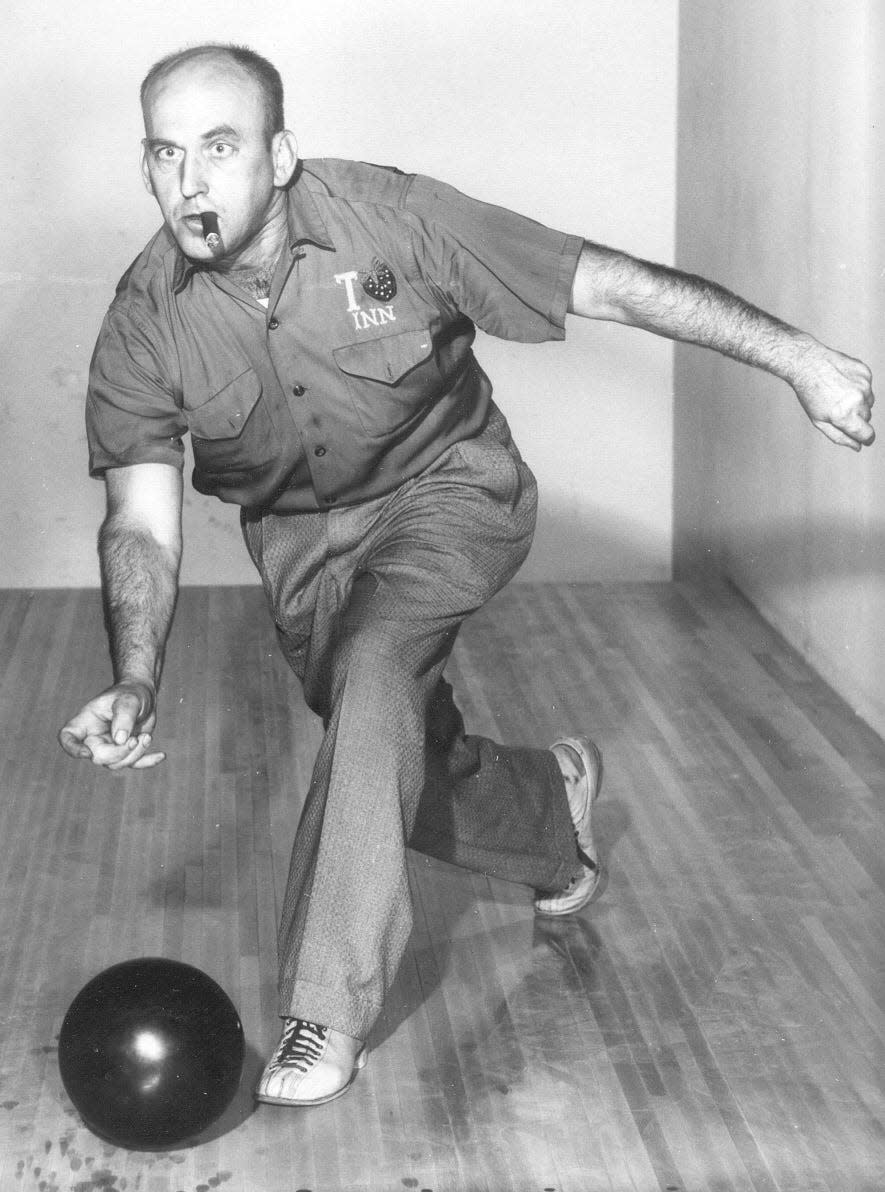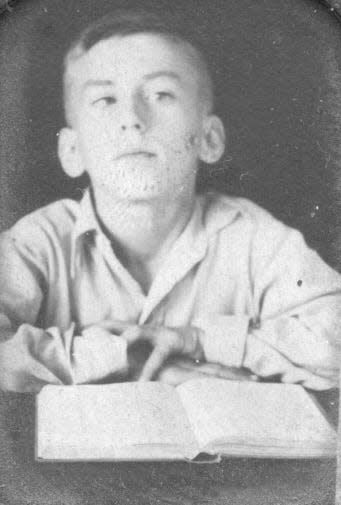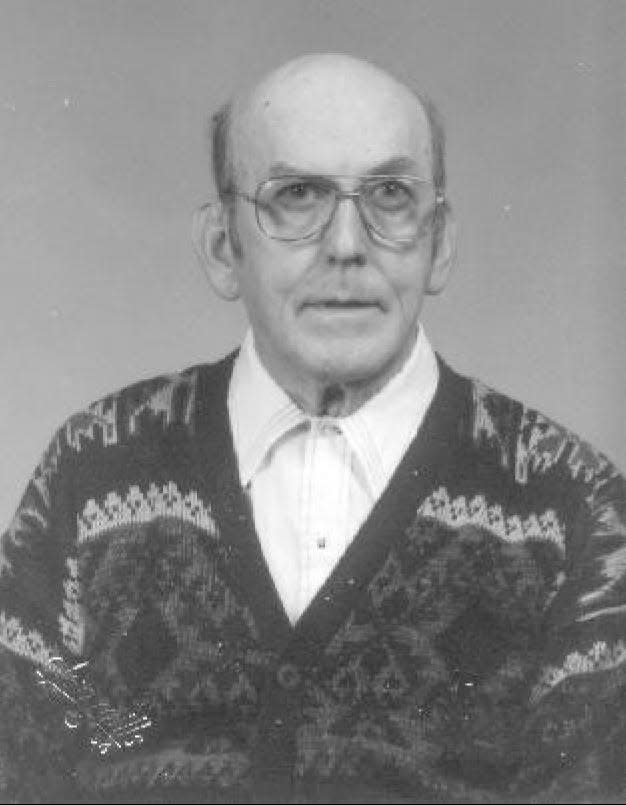Remembering Dutch Eby

- Oops!Something went wrong.Please try again later.
Varnum Charles Eby was born on Aug. 29, 1924, on the family farm in Maybee. The world knew him as “Dutch” Eby.
His birth was difficult, and the young attending physician used instruments to pull him from his mother’s womb. Damage was done to Dutch’s spine and body in the process, and it left him badly crippled in his early years. I do not recall it ever being spoken but he had the conditions associated with cerebral palsy throughout his life. Dutch was the first baby the young doctor had ever delivered. Despite the injuries, or maybe because of the injuries, his parents named him after the young physician who brought him into the world, The doctor later died from wounds he received in World War II while serving in the Pacific area.
As a baby it took two people to change Dutch’s diapers; one to pull his bent legs away from his body and the other to change his diaper. He literally dragged his crippled body as a child using his arms to pull himself forward. His legs simply did not work. He did not fully walk until he was 7 years old. When he tried to run with other children he would run five steps then fall down then run another five steps and fall again, over and over. No matter how many times he fell, he never failed to get back up.
From the day he was born until the day he died Dutch lived exactly 35,446 days. Every last one of those days was a challenge to him physically in some way. Simply eating a meal was no easy task as he had lifelong tremors from the birth injuries that caused his arms to shake. He would have to hold his right wrist with his left hand to control the fork he held in order to eat. Even then it was difficult.

In spite of everything, he lived a fuller life than many people. As a child he learned skills on his parents’ farm that were needed in order to survive the Great Depression years. Throughout his life he used those skills to can and preserve various things from a garden. He made homemade sausage, wine, pickles, sauerkraut, ketchup and numerous other foods. The first time he was old enough to go hunting as a young boy, a relative wouldn’t go with him and belittled him into tears. His father took him aside and told him to take the family hunting dog and go hunt on his own. He returned home alone that day with two pheasants and a rabbit.
Life was filled with endless challenges for Dutch. Throughout his life some people were cruel and insensitive to him while others were kind. When kids were chosen into teams at his one-room school to play ball during the 1930s, some would not include Dutch, but one neighbor boy named Warren Gruber always made sure he picked Dutch to be on his team.
After his schooling in Carleton ended with the completion of the eighth grade, Dutch entered the working world. He had spent his youth working on the family farm and his first job was as a mechanic's assistant in Dundee for which he received $12 a week which was about what his room and board cost. He fully credited chiropractors, starting with one he met in Dundee, with getting his body functional enough to become employed at a factory and with helping him remain employed throughout his life.
His first factory job was at a paper mill in Monroe. After that he was employed at the Kelsey Hayes factory. On Feb. 11, 1950, he was working in the paint room at Kelsey Hayes when an explosion occurred. He was walking near a boiler pipe when a voice called out to “get down.” He dropped to the floor just as an explosion took place. He never knew who told him to get down or how anyone could have known an explosion was imminent. The voice came out of nowhere but he heard it distinctly, obeyed it and lived.
The explosion set Dutch’s clothing on fire. Another worker tried to help Dutch, and Dutch yelled at him to get away as both of them had flammable solvents on their clothing. The man who tried to help Dutch caught fire himself from doing so and died from his burns. It was suppose to have been his last day on the job. He left behind a wife and 10 children.
Other workers dragged Dutch into a bathroom screaming while he was still on fire and where they threw water on his burning clothing and extinguished the flames. Although badly burned on his legs, he did recover. He never forgot the man who died while trying to save him. His name was Frank Gotha Sr. from Ida.

Later in 1950, Dutch managed to get employment as a laborer at the new Monroe Ford Plant. I am not sure how he passed his physical but he worked there for a full 30 years doing manual labor despite his considerable physical ailments. Many people that knew Dutch greatly admired him for his never ending efforts to live a life like others.
Dutch enjoyed watching sports on television even though he could never physically play them. He did learn how to bowl and play golf and became good at both. He loved to play cards and hated to lose. If you were his card partner and misplayed a card he let you know about it, as many of his relatives can attest to. A life-long hunter and fisherman, he used a walker to make his way to his deer blind every winter when he was in his 80s when walking became very difficult. He went deer hunting 70 consecutive years before he had to give it up. He took fishing trips into the Canadian wilderness when he was young and could hold his own with anyone as a hunter and outdoorsman.
In the early 1950s, the average factory worker made less than $5,000 dollars a year. During that time Dutch was the manager of a three-lane bowling alley at the Carleton Hotel along with his work at a factory. Between the two jobs he earned $19,000 a year. According to Dutch, he spent most of it drinking too much. It was at a time when it seemed that every bar maid in Michigan knew Dutch on a first name basis.
He met his future wife, Sylvia, at the time his mother was ill in 1962. Although 16 years older than Dutch, they married and spent many happy years together. It was Sylvia who brought stability and happiness into Dutch’s life. They traveled together and spent hundreds of weekends at their cabin in north Michigan where they would snowmobile, fish, pick wild berries and mushrooms, socialize, and enjoy life. Dutch’s devotion to Sylvia was unwavering and he cared for her until her death. Whenever he returned to Carleton he always visited Sylvia’s grave and always said a silent prayer for her.
A devout Catholic, it was stressed to him as a child that he was to attend Mass every Sunday no matter what. As a young man he enjoyed drinking and socializing on Saturday nights but come Sunday morning regardless of his condition or location he attended Mass, sometimes going straight from an all-night party to a church.
When Dutch’s mother was ill and dying, it was Dutch who paid for her medicine and medical costs at a time when she had no insurance and he had no savings or excess income. Upon her death there was over $10,000 in medical bills that Dutch paid for alone over a period of years. It was a huge amount of money at the time. He wasn’t legally obligated to pay them but he felt responsible for her care and he wasn’t going to beat anyone out of their money. When his father died some 13 years earlier, Dutch and his brother Jim paid off the considerable medical bills from his care as well.
There are many stories about Dutch over the years. When he lived in Hale he would visit the Eagles club for a night out. Because of his difficulty in walking, his tremors and somewhat slurred speech he could be mistaken for excessive drinking. The state police would occasionally follow him and pull him over for a Breathalyzer test. It annoyed him to no end so one time he blew a wad of chewed tobacco into the Breathalyzer. When the female officer pulled it out of his mouth with the tobacco hanging out of it she got somewhat sick. It was the last time Dutch ever got pulled over.
Once when Dutch was deer hunting and sitting in his blind he fell asleep. When he woke up a deer was standing beside him looking down at Dutch. Startled, Dutch dropped his rifle and the deer got away.
He taught his four grandsons, Frank, Jon, Scott and Mike, how to hunt and fish as well as two of his great grandchildren, Mary and JJ. He also taught them the survival skills he had learned on his parents’ farm. It was Mary, and later JJ in particular, who cared for Dutch in his later years, allowing him to stay in his own home in Hale until he no longer could. Enough accolades cannot be said about JJ's devotion to and care of Dutch that spanned years.
Dutch had a huge impact in the lives of his four grandsons and two great-grandchildren. My brother Ernie visited Dutch many times over many years and helped him in whatever way he could. Dutch and my father spent endless hours in their retirement years hunting, drinking homemade wine and playing cards together, and after my father died it was Ernie who always made the time to take Dutch hunting throughout the autumn months. Dutch had a number of highly devoted friends including his neighbor Kenny Harley and friends Chris and Trina Carder who visited him often. My brother-in-law Ritch Radcliffe spent many weekends with Dutch.
Dutch and the life he lived were extraordinary in every sense of the word. If he was supposed to have lived a life as a totally disabled person, no one ever told him and he wouldn’t have cooperated anyway. For as long as I knew him he was simply “Uncle Dutch” and his arms shook. I never knew the scope of his birth injuries or the hardships he endured and overcame until the last years of his life when he would talk about it, a little at a time. He never considered himself different from anyone else and refused anyone’s pity or help. Dutch lived the life he was given to the fullest and he never gave up or gave in to what life brought his way.
Dutch died on Sept. 24, 2021, at age 97. He is gone but won’t be forgotten anytime soon by those who knew him.
Written by his nephew, David L. Eby.
This article originally appeared on The Daily Telegram: Remembering Dutch Eby

